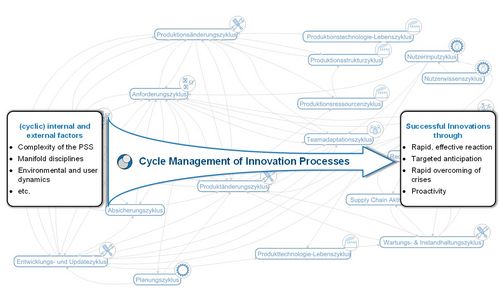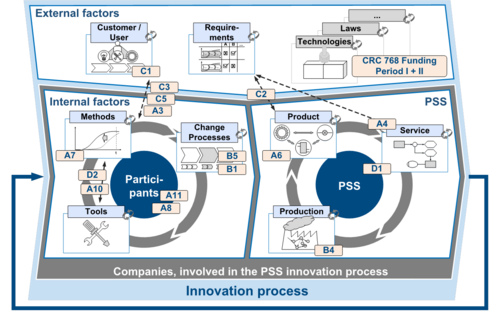The Collaborative Research Center SFB / CRC 768
The objective of the Collaborative Research Center 768 "Managing Cycles in Innovation Processes – Integrated Development of Product-Service Systems Based on Technical Products" is the handling and design of innovation processes while taking into account cyclic influencing factors, in order to enable companies to successfully persist on the market. The focus of the observed market offer of the companies are combined product offering and service provision, the so-called "Product Service System" (PSS).
Cycles are described as recurring patterns – temporal and structural ones – which influence the factors on the innovation process internally and externally within the company. A cycle is characterized by its trigger, phases, duration and effect. Examples for cycles internally within the company are planning and development cycles, recurring processes (e.g. change processes) or changes within the organizational structure and team changes. The external cycles in the form of, for example, customer demand coverage, innovation cycles at the market or new product and production technologies, influence the innovation process. Within this innovation process, the different internal and external cycles underlie numerous, partly temporal entanglements and dependencies. Companies are facing the challenge to successfully act and react in a conflicting environment, which is highly impacted by internal and external cycles along the innovation process. The increasing global competition moreover requires companies to decrease the length of their innovation cycles, to lower the timespan for acquiring new innovations or to shorten the time to integrate novel technologies. In addition, the necessary coordination and communication effort increases, because the number of subject areas and qualified personal involved in the innovation process rises, especially if companies transform themselves from product providers to PSS providers. As a consequence, the successful management of cycles within innovation processes is becoming more and more important for the companies in order to successfully persist in the related market and to stay competitive. Therefore the cross-disciplinary goal of the CRC 768 is to gather and to analyze the dependencies of the several internal and external cycles in the innovation process of PSS and to develop methods, models and tools, which empower companies towards a cycle oriented design of the innovation process.
Based on this starting point, six overall closely related action fields are derived as a frame for the work within the CRC 768. These include to support the development and delivery of PSS with fitting methods and tools, to increase the innovation ability through a needs-based adjustment of the range of services and to command the thereby existing complexity not only on a structural plan but also on process and organization structure plan. Likewise, the focus is on the increase of efficiency for acceleration of the innovation process and also the anticipation of cycles and the planning and coordination across all disciplines. Finally, the CRC addresses in a transdisciplinary approach as well as a holistic nature during the execution of the innovation process.
Regarding the development of cycle management of innovation processes as an approach of the CRC 768, the research group follows the three steps Comprehend – Modelling – Design in its approach during the entire three funding periods. The approach consists of the entirety of the in the involved disciplines, the acquired models, methods and tools as well as their integration. The basic components for acquiring the expected results in the CRC 768 are a transdisciplinary approach, close connection of the partial solutions and a consistent orientation at the innovation process. These are reflected by the position of the subprojects in the project areas Process Foundations, Creating Solutions, Market orientation as well as the over-arching project area Integrative Shaping. Due to the transdisciplinary viewpoint of the innovation processes in CRC 768, the technical as well as the sociotechnical perspective is merged, which forms a prerequisite for a successful and sustainable implementation of managing cycles.
Following the mentioned three steps, the relevant cycles in the innovation process were identified and characterized during the first funding period. The cycles were analyzed and brought together for their respective disciplines regarding their anticipation, influence ability and effect on the innovation process. This basic understanding of the cycles forms the requirement for modeling and design, which is the basis for managing cycles and innovation processes. On this basis, the identified cycles and cycle-relevant elements were modeled in the second funding period. Concerning this several discipline specific and discipline overarching methods and models were developed to enable the usage for the identified cycles. Thereby, the subproject-specific model approaches form the aspects of the respective disciplines in the innovation process. As a preparation for the design, the model interfaces were identified and characterized.
This forms the foundation for the method- and tool-supported design of the cycle management within innovation processes, which has to be developed in the third funding period. With the aid of the transdisciplinary methods and tools, companies are qualified for effective and efficient design of innovative, technical PSS. The CRC 768 thus contributes, on a scientific as well as on an industrial perspective, to the management of internal and external cycles in the innovation process of the PSS.

